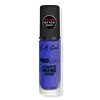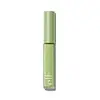What's inside
What's inside
 Key Ingredients
Key Ingredients

 Benefits
Benefits

 Concerns
Concerns

 Ingredients Side-by-side
Ingredients Side-by-side

Water
Skin ConditioningDimethicone
EmollientCyclopentasiloxane
EmollientAluminum Starch Octenylsuccinate
AbsorbentMethyl Methacrylate Crosspolymer
Silica
AbrasiveGlycerin
HumectantPEG-10 Dimethicone
Skin ConditioningPhenoxyethanol
PreservativeDisteardimonium Hectorite
StabilisingDimethicone/Vinyl Dimethicone Crosspolymer
Skin ConditioningCaprylyl Glycol
EmollientTocopheryl Acetate
AntioxidantEthylhexylglycerin
Skin ConditioningPanthenol
Skin ConditioningDisodium EDTA
Helianthus Annuus Seed Oil
EmollientTriethoxycaprylylsilane
Trimethoxycaprylylsilane
SmoothingAluminum Hydroxide
EmollientTocopherol
AntioxidantCI 77492
Cosmetic ColorantCI 77891
Cosmetic ColorantWater, Dimethicone, Cyclopentasiloxane, Aluminum Starch Octenylsuccinate, Methyl Methacrylate Crosspolymer, Silica, Glycerin, PEG-10 Dimethicone, Phenoxyethanol, Disteardimonium Hectorite, Dimethicone/Vinyl Dimethicone Crosspolymer, Caprylyl Glycol, Tocopheryl Acetate, Ethylhexylglycerin, Panthenol, Disodium EDTA, Helianthus Annuus Seed Oil, Triethoxycaprylylsilane, Trimethoxycaprylylsilane, Aluminum Hydroxide, Tocopherol, CI 77492, CI 77891
Water
Skin ConditioningDimethicone
EmollientPropylene Glycol
HumectantOctyldodecanol
EmollientHydrogenated Polyisobutene
EmollientCeramide AP
Skin ConditioningPolyglyceryl-4 Isostearate
EmulsifyingBoron Nitride
AbsorbentCaprylic Acid
CleansingHydrogenated Styrene/Methylstyrene/Indene Copolymer
Sodium Chloride
MaskingDiethylhexyl Carbonate
EmollientAcrylates/Dimethicone Copolymer
Skin ConditioningVinyl Dimethicone/Methicone Silsesquioxane Crosspolymer
Mica
Cosmetic ColorantPhenoxyethanol
PreservativePropylene Carbonate
SolventIsopropyl Titanium Triisostearate
EmollientAlumina
AbrasiveEthylhexylglycerin
Skin ConditioningCaprylyl Glycol
EmollientDisodium EDTA
Pentaerythrityl Tetra-Di-T-Butyl Hydroxyhydrocinnamate
AntioxidantSodium Hyaluronate
HumectantCI 77891
Cosmetic ColorantCI 77288
Cosmetic ColorantCI 77492
Cosmetic ColorantUltramarines
Water, Dimethicone, Propylene Glycol, Octyldodecanol, Hydrogenated Polyisobutene, Ceramide AP, Polyglyceryl-4 Isostearate, Boron Nitride, Caprylic Acid, Hydrogenated Styrene/Methylstyrene/Indene Copolymer, Sodium Chloride, Diethylhexyl Carbonate, Acrylates/Dimethicone Copolymer, Vinyl Dimethicone/Methicone Silsesquioxane Crosspolymer, Mica, Phenoxyethanol, Propylene Carbonate, Isopropyl Titanium Triisostearate, Alumina, Ethylhexylglycerin, Caprylyl Glycol, Disodium EDTA, Pentaerythrityl Tetra-Di-T-Butyl Hydroxyhydrocinnamate, Sodium Hyaluronate, CI 77891, CI 77288, CI 77492, Ultramarines
 Reviews
Reviews

Ingredients Explained
These ingredients are found in both products.
Ingredients higher up in an ingredient list are typically present in a larger amount.
Caprylyl Glycol is a humectant and emollient, meaning it attracts and preserves moisture.
It is a common ingredient in many products, especially those designed to hydrate skin. The primary benefits are retaining moisture, skin softening, and promoting a healthy skin barrier.
Though Caprylyl Glycol is an alcohol derived from fatty acids, it is not the kind that can dry out skin.
This ingredient is also used as a preservative to extend the life of products. It has slight antimicrobial properties.
Learn more about Caprylyl GlycolCi 77492 is also hydrated iron III oxide. It's sole purpose is to give a yellow hue to products.
Iron III oxides are classified as inorganic chemicals for coloring.
Synthetically created Ci 77492 is considered safer than those naturally found. This is because the synthetically created version may contain less impurities. Iron oxides are generally non-toxic and non-allergenic.
Learn more about CI 77492Ci 77891 is a white pigment from Titanium dioxide. It is naturally found in minerals such as rutile and ilmenite.
It's main function is to add a white color to cosmetics. It can also be mixed with other colors to create different shades.
Ci 77891 is commonly found in sunscreens due to its ability to block UV rays.
Learn more about CI 77891Dimethicone is a type of synthetic silicone created from natural materials such as quartz.
What it does:
Dimethicone comes in different viscosities:
Depending on the viscosity, dimethicone has different properties.
Ingredients lists don't always show which type is used, so we recommend reaching out to the brand if you have questions about the viscosity.
This ingredient is unlikely to cause irritation because it does not get absorbed into skin. However, people with silicone allergies should be careful about using this ingredient.
Note: Dimethicone may contribute to pilling. This is because it is not oil or water soluble, so pilling may occur when layered with products. When mixed with heavy oils in a formula, the outcome is also quite greasy.
Learn more about DimethiconeDisodium EDTA plays a role in making products more stable by aiding other preservatives.
It is a chelating agent, meaning it neutralizes metal ions that may be found in a product.
Disodium EDTA is a salt of edetic acid and is found to be safe in cosmetic ingredients.
Learn more about Disodium EDTAEthylhexylglycerin (we can't pronounce this either) is commonly used as a preservative and skin softener. It is derived from glyceryl.
You might see Ethylhexylglycerin often paired with other preservatives such as phenoxyethanol. Ethylhexylglycerin has been found to increase the effectiveness of these other preservatives.
Phenoxyethanol is a preservative that has germicide, antimicrobial, and aromatic properties. Studies show that phenoxyethanol can prevent microbial growth. By itself, it has a scent that is similar to that of a rose.
It's often used in formulations along with Caprylyl Glycol to preserve the shelf life of products.
Water. It's the most common cosmetic ingredient of all. You'll usually see it at the top of ingredient lists, meaning that it makes up the largest part of the product.
So why is it so popular? Water most often acts as a solvent - this means that it helps dissolve other ingredients into the formulation.
You'll also recognize water as that liquid we all need to stay alive. If you see this, drink a glass of water. Stay hydrated!
Learn more about Water